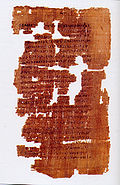
Back إنجيل الإبيونيين Arabic انجيل الابيونيين ARZ Евангелие на евионитите Bulgarian Evangeli dels ebionites Catalan Ebionitenevangelium German Evangelio laŭ Ebionitoj Esperanto Evangelio de los ebionitas Spanish انجیل ابیونی Persian Ebioniittien evankeliumi Finnish Évangile des Ébionites French

| Part of a series on |
| New Testament apocrypha |
|---|
 |
|
|
The Gospel of the Ebionites is the conventional name given by scholars[n 1] to an apocryphal gospel extant only as seven brief quotations in a heresiology known as the Panarion, by Epiphanius of Salamis;[n 2] he misidentified it as the "Hebrew" gospel, believing it to be a truncated and modified version of the Gospel of Matthew.[1] The quotations were embedded in a polemic to point out inconsistencies in the beliefs and practices of a Jewish Christian sect known as the Ebionites relative to Nicene orthodoxy.[n 3]
The surviving fragments derive from a gospel harmony of the Synoptic Gospels, composed in Greek with various expansions and abridgments reflecting the theology of the writer. Distinctive features include the absence of the virgin birth and of the genealogy of Jesus; an Adoptionist Christology,[n 4] in which Jesus is chosen to be God's Son at the time of his Baptism; the abolition of the Jewish sacrifices by Jesus; and an advocacy of vegetarianism.[n 5]
The omission of the genealogical records and the virgin birth of Jesus narrative is explained by Epiphanius as being because "they insist that Jesus was really man."[2][3]
It is believed to have been composed some time during the middle of the 2nd century[4] in or around the region east of the Jordan River.[n 6] Although the gospel was said to be used by "Ebionites" during the time of the early church,[n 7] the identity of the group or groups that used it remains a matter of conjecture.[n 8]
The Gospel of the Ebionites is one of several Jewish–Christian gospels, along with the Gospel of the Hebrews and the Gospel of the Nazarenes; all survive only as fragments in quotations of the early Church Fathers. Due to their fragmentary state, the relationships, if any, between the Jewish–Christian gospels and a hypothetical original Hebrew Gospel are uncertain and have been a subject of intensive scholarly investigation.[n 9] The Ebionite gospel has been recognized as distinct from the others,[n 10] and it has been identified more closely with the lost Gospel of the Twelve.[n 11] It shows no dependence on the Gospel of John and is similar in nature to the harmonized gospel sayings based on the Synoptic Gospels used by Justin Martyr, although a relationship between them, if any, is uncertain.[5] There is a similarity between the gospel and a source document contained within the Clementine Recognitions (1.27–71), conventionally referred to by scholars as the Ascents of James, with respect to the command to abolish the Jewish sacrifices.[n 12]
Cite error: There are <ref group=n> tags on this page, but the references will not show without a {{reflist|group=n}} template (see the help page).
- ^ Koch 1990, pp. 224–5.
- ^ Epiphanius, Anacephalaiosis 14:1
- ^ Klijn, A.F.J; Reinink, G.J. (1973), pp. 30–31, 34, 43
- ^ Cameron 1982, pp. 103–6.
- ^ Petersen 1992, p. 262.